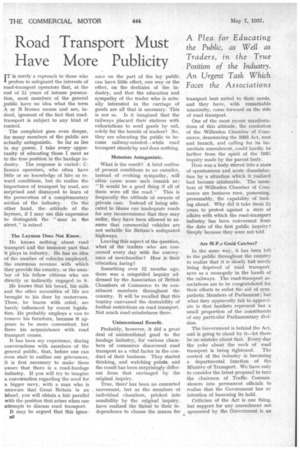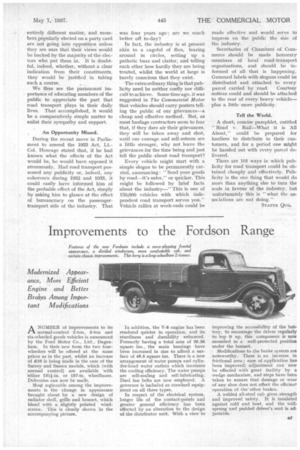Road Transport Must Have More Publicity
Page 40

Page 41

If you've noticed an error in this article please click here to report it so we can fix it.
A Plea for Educating the Public, as Well as Traders, in the True Position of the Industry. An Urgent Task Which Faces the Associations
IT is surely a reproach to those who profess to safeguard the interests of road-transport operators that, at the end of 24 years of intense persecution, most members of the general public have no idea what the term A or B licence means and are, indeed, ignorant of the fact that roadtransport is subject to any kind of control.
The complaint goes even deeper, for many members of the public are actually antagonistic. So far as lies in my power, I take every opportunity of educating those I meet as to the true position in the haulage industry. The response is varied : Clicence operators, who often have little or no knowledge of hire or reward conditions, but do realize thc importance of transport by road, are surprised and dismayed to learn of the persecution of a complementary section of the industry. On the other hand, the attitude of the layman, if I may use this expression to distinguish the " man in the street," is mixed.
The Layman Does Not Know.
He knows nothing about road transport and the immense part that it plays in industry. He has no idea of the number of vehicles employed, the enormous revenue with which they provide the country, or the number of his fellow citizens who are directly or indirectly engaged in it.
He knows that his bread, his milk. and the other necessities of life are brought to his door by motorvans. These, he learns with relief, are barely influenced by recent legislation. He probably employs a van to remove his furniture, because it appears to be more convenient, but there his acquaintance with road transport ceases.
It has been my experience, during conversations with members of the general public, that, before one can even start to outline our grievances, it is first necessary to make them aware that there is a road-haulage industry. If you will try to imagine a conversation regarding the need for a bigger navy, with a man who is unaware that Great Britain is an island, you will obtain a fair parallel with the position that arises when one attempts to discuss road transport.
It may be argued that this ignor B6 ance on the part of the lay public cau have little effect, one way or the other, on the destinies of the industry, and that the education and sympathy of the trader who is actually interested in the carriage of goods are all that is necessary. This is not so. Is it imagined that the railways placard their stations with exhortations to send goods by rail, solely, for the benefit of traders? No, they are educating the public to become railway-minded--while road transport stands by and does nothing.
Motorists Antagonistic.
What is the result? A brief outline of present conditions to an outsider, instead of evoking sympathy, will often cause some such remark as : "It would be a good thing if all of them were off the road." This is frequently the attitude of owners of private cars. Instead of being educated to blame our inadequate roads for any inconvenience that they may suffer, they have been allowed to assume that commercial vehicles are not suitable for Britain's antiquated highways.
Leaving this aspect of the question, what of the traders who are concerned every day with the conveyance of merchandise? How is their education faring?
Something over 12 months ago. there was a misguided inquiry addressed by the Association of British Chambers of Commerce to its constituent members throughout the country. It will be recalled that this inquiry canvassed the desirability of further restrictions on road transport. Not much road-mindedness there.
Unintentional Benefit.
Probably, however, it did a great deal of unintentional good to the haulage industry, for various chambers of commerce discovered road transport as a vital factor in the conduct of their business. They started thinking,. and watching points, and the result has been surprisingly different from that envisaged by the original inquiry.
True, there' has been no concerted movement, but as the members of individual chambers, pricked into sensibility by the original inquiry, have realized the threat to their independence to choose the means for
transport best suited to their needs, and they have, with remarkable unanimity, come forward on the side of road transport.
One of the most recent manifestations of this attitude, the resolution of the Willesden Chamber of Commerce, denouncing the 1933 Act, root and branch, and calling for its immediate amendment, could hardly be farther from the spirit of the 193-) inquiry made by the parent body.
Here was a body stirred into a state of spontaneous and acute dissatisfaction by a situation which it realized had become intolerable. The members of Willesden Chamber of Commerce are business men, possessing, presumably, the capability of looking ahead. Why did it take them 24 years to protest against a state of affairs with which the road-transport industry has been conversant from the date of the first public inquiry? Simply because they were not told.
Are M.P.s Good Catches?
In the same way, it has been left to the public throughout the country to realize that it is slowly but surely being deprived of road transport, save as a monopoly in the hands of the railways. The road-transport associations are to be congratulated for their efforts to enlist the aid of sympathetic Members of Parliament ; but what they apparently fail to appreciate is that hauliers represent but a small proportion of the constituents of any particular Parliamentary division.
The Government is behind the Act, and is going to stand by it—let there be no mistake about that. Everyday the yoke about the neck of road transport is being tightened. The control of the industry is becoming a departmental function of the Ministry of Transport. We have only to consider the latest proposal to turn the chairmen of Traffic Commis. sioners into permanent officials to realize that the Government has ric intention of loosening its hold.
Criticism of the Act is one thing. but support for any amendment not sponsored by the Government is an entirely different matter, and members popularly elected on a party card are not going into opposition unless they are sure that their views would be backed by the majority of the electors who put them in. It is doubtful, indeed, whether, without a clear indication from their constituents, they would be justified in taking such a course.
We thus see the paramount importance of educating members of the public to appreciate the part that road transport plays in their daily lives. That accomplished, it would be a comparatively simple matter to enlist their sympathy and support.
An Opportunity Missed.
During the recent move in Parliament to amend the 1933 Act, Lt.Col. Heneage stated that, if he had known what the effects of the Act would be, he would have opposed it strenuously. Had road transport possessed any publicity or, indeed, any coherence during 1932 and 1933, it could easily have informed him of the probable effect of the Act, simply by asking him to glance at the effect of bureaucracy on the passengertransport side of the industry. That was four years ago : are we much better off to-day?
In fact, the industry is at present akin to a cagefnl of flies, tearing around in circles, setting up a pathetic buzz and clatter, and telling each other how hardly they are being treated, whilst the world at large is barely conscious that they exist.
The extraordinary thing is that publicity need be neither costly nor difficult to achieve. Some time ago, it was suggested in The Commercial Motor that vehicles should carry posters telling the public of our grievances—a cheap and effective method. But, as most haulage contractors seem to fear that, if they dare air their grievances, they will be taken away and shot, until our courage and self-esteem are a little stronger, why not leave the grievances for the time being and just tell the public about road transport?
Every vehicle might start with a simple slogan to be permanently carried, announcing " Send your goods by road--it's safer," or quicker. This might be followed by brief facts about the industry—" This is one of 150,000 vehicles with which independent road transport serves you." Vehicle rallies at week-ends could be made effective and would serve to impress on the public the size of the industry.
Secretaries of Chambers of Commerce should be made honorary members of local road-transport organizations, and should be informed of all that is happening. Gummed labels with slogans could be distributed and attached to every parcel carried by road. Courtesy notices could and should be attached to the rear of every heavy vehicle— phis a little more publicity.
Tell the World.
A short, concise pamphlet, entitled " Road v. Rail—What it is All About," could be prepared for hauliers to distribute to their customers, and for a period one might be handed out with every parcel delivered.
There are 101 ways in which publicity for road transport could be obtained cheaply and effectively. Publicity is the one thing that would do more than anything else to turn the scale in favour of the industry, but unfortunately this is "what the associations are not doing."
STATUS Quo.




















































































